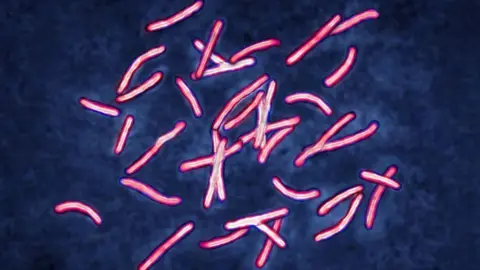AI cracks superbug problem in two days that took scientists years
 Getty Images
Getty ImagesA complex problem that took microbiologists a decade to get to the bottom of has been solved in just two days by a new artificial intelligence (AI) tool.
Professor José R Penadés and his team at Imperial College London had spent years working out and proving why some superbugs are immune to antibiotics.
He gave "co-scientist" - a tool made by Google - a short prompt asking it about the core problem he had been investigating and it reached the same conclusion in 48 hours.
He told the BBC of his shock when he found what it had done, given his research was not published so could not have been found by the AI system in the public domain.
"I was shopping with somebody, I said, 'please leave me alone for an hour, I need to digest this thing,'" he told the Today programme, on BBC Radio Four.
"I wrote an email to Google to say, 'you have access to my computer, is that right?'", he added.
The tech giant confirmed it had not.
The full decade spent by the scientists also includes the time it took to prove the research, which itself was multiple years.
But they say, had they had the hypothesis at the start of the project, it would have saved years of work.
Prof Penadés' said the tool had in fact done more than successfully replicating his research.
"It's not just that the top hypothesis they provide was the right one," he said.
"It's that they provide another four, and all of them made sense.
"And for one of them, we never thought about it, and we're now working on that."
Bugged by superbugs
The researchers have been trying to find out how some superbugs - dangerous germs that are resistant to antibiotics - get created.
Their hypothesis is that the superbugs can form a tail from different viruses which allows them to spread between species.
Prof Penadés likened it to the superbugs having "keys" which enabled them to move from home to home, or host species to host species.
Critically, this hypothesis was unique to the research team and had not been published anywhere else. Nobody in the team had shared their findings.
So Mr Penadés was happy to use this to test Google's new AI tool.
Just two days later, the AI returned a few hypotheses - and its first thought, the top answer provided, suggested superbugs may take tails in exactly the way his research described.
'This will change science'
The impact of AI is hotly contested.
Its advocates say it will enable scientific advances - while others worry it will eliminate jobs.
Prof Penadés said he understood why fears about the impact on jobs such as his was the "first reaction" people had but added "when you think about it it's more that you have an extremely powerful tool."
He said the researchers on the project were convinced that it would prove very useful in the future.
"I feel this will change science, definitely," Mr Penadés said.
"I'm in front of something that is spectacular, and I'm very happy to be part of that.
"It's like you have the opportunity to be playing a big match - I feel like I'm finally playing a Champions League match with this thing."
